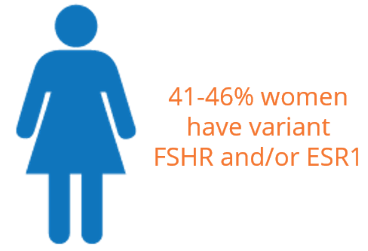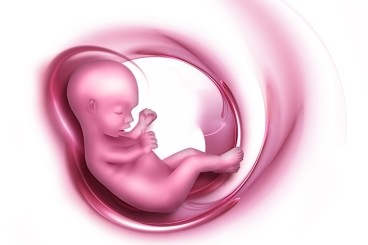 Increase your chance of successful pregnancy by IVF or ICSI
Increase your chance of successful pregnancy by IVF or ICSI
Predict your outcome for artificial reproductive techniques (ART) and personalize therapy
Majority of IVF patients are poor responders
Studies indicate that up to 75% of women undergoing IVF have variants in the ESR1 and FSHR genes. These affect the response and outcome to infertility treatments such as in vitro fertilization (IVF) or intracytoplasmic sperm injection (ICSI). Diagnosis of these variants can help personalize hormonal therapy such as treatment with gonadotropins (FSH and LH) during IVF cycles. This has been shown to significantly increase pregnancy outcome.
Targeted ovarian stimulation for IVF
Genetic variations can cause poor response in women undergoing IVF. They may need higher doses of hormones (follicle stimulating hormone, FSH) for ovarian stimulation to achieve better quality and a higher number of eggs or oocytes.
Women without these variants are good responders to IVF and may require only standard doses of hormones such as FSH. You can benefit from personalized treatment decreasing overall expenses in artificial reproductive techniques and the number of IVF cycles.
Genetics of poor IVF response, and FAQs
FSHR is the receptor for follicle stimulating hormone (FSH). Mutation in this gene decreases receptor binding to the hormone and reduces the receptor activity. Similarly, ESR1 is the receptor for the hormone, estrogen. Mutation in ESR1 decreases receptor binding to estrogen, thereby reducing its consequent effects. These hormones play an important role in female reproduction. Decreased activity leads to fewer antral follicles, fewer good quality oocytes, and fewer oocytes for IVF.
The test detects specific mutations in the genes FSHR (2039A>G) and ESR1 (453-397C>T) to predict response to ovarian stimulation in IVF and guide targeted therapy. The test is performed by allele-specific real-time PCR, which has nearly 100% analytical accuracy and sensitivity. However, other mutations or factors affecting IVF response and pregnancy are not tested.

References
Yan Y et al. 2013, PLoS One
Lledo B et al. 2013, Pharmacogenetics and Genomics
Ayvaz O et al. 2009, Journal of Assisted Reproduction Genetics
Altmae S et al. 2007, Molecular Human Reproduction
